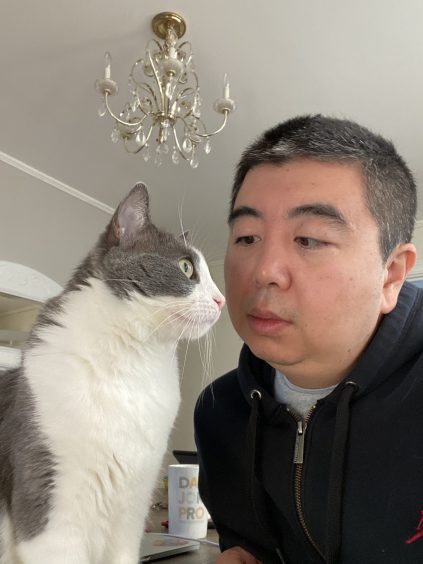Hao Hong
Associate Professor of Philosophy and Honors
Office: The Maples 211
B.A. Peking University
M.A. Peking University
Ph.D. Indiana University Bloomington
Hao Hong is an Associate Professor of philosophy and CLAS-Honors Preceptor of Philosophy, a joint appointment in the Department of Philosophy and the Honors College at the University of Maine.
Research Interests:
My primary research area is metaphysics broadly construed, including contemporary analytic metaphysics, the history of metaphysics, and comparative metaphysics. I think and write on topics in metaphysics and in the overlap between metaphysics and philosophy of language in the analytic-philosophical style by engaging with theoretical resources in various philosophical traditions. Topics that I am especially interested in include metaphysical anti-realism, truthmaking, and metaphysical explanation.
Please update the “Publications” part as follows:
– (Forthcoming). “Things and What is Beyond All Things: Clarifying the Relationship between You (有) and Wu (无) in Wei-Jin Xuanxue (魏晋玄学),” in Ziporyn and Walker (Eds.), The Routledge Companion to Chinese Philosophy.
– (Forthcoming). “In What Way is Truthmaking Truth-Causing? A Power-based, Causal Account of Truthmaking,” Erkenntnis (online-first). https://doi.org/10.1007/s10670-025-00981-1
– (2024). “Names Exist when Carving Begins (始制有名): A Theory of Names in Daodejing (道德經),” Asian Philosophy 34(2), 136-152. https://doi.org/10.1080/09552367.2024.2299896
– (2023). “Honors Flourishing in the Midst of Change,” (with Mimi Killinger, Robert Glover, and Jordan LaBouff) Journal of the National Collegiate Honors Council 24(1), 33-38.
– (2021). “Many Problems of the Many,” Synthese 199, 3101-3116. https://doi.org/10.1007/s11229-020-02926-3
– (2021). “A Challenge to the New Metaphysics: deRosset, Priority, and Explanation,” (with David Fisher and Timothy Perrine) Synthese 198, 6403-6433. https://doi.org/10.1007/s11229-019-02468-3
– (2019). “The Metaphysics of Dao in WANG Bi’s Interpretation of Laozi,” Dao: A Journal of Comparative Philosophy 18(2), 219-240. https://doi.org/10.1007/s11712-019-09657-4
Why I Teach in Honors: To me, what defines Honors is the liberal arts environment: discussion-based classrooms, small class sizes, writing intensive courses, and community-engaged experience. This kind of environment is crucial to the cultivation of a good person and a good citizen. In front of the moral, social, and political issues in today’s society, we are always encouraged to share our thoughts with others and listen to other people’s voices, and we are constantly reminded of the importance of having civil and constructive conversations on the basis of mutual respect. However, having constructive conversations is not something that we learn from books nor something that we can do well merely by emphasizing its importance. Rather, it is a skill, a skill that has to be grasped through repeated practices. I believe that the liberal arts environment in Honors is the best “practice field” for having constructive conversations on important issues in our society. My ideal classroom in Honors is inclusive, where students share their thoughts and perspectives without feeling being judged; it is respectful, where people’s lived experience and opinions are recognized and valued; it is critical, where students are not afraid of disagreeing with, challenging, and pushing each other for the purpose of finding the best answers to important questions. Meanwhile, my ideal classroom is tolerant. We learn things that we do not know, and we practice skills that we do not grasp perfectly. Mistakes are not only inevitable in this learning process but also create opportunities for us to improve. Tolerance gives us the courage to expose our potential mistakes and learn from them.
Other Honors Involvement: I recently gave two lectures on Confucianism and Daoism respectively.
Publications:
- (Forthcoming). “Things and What is Beyond All Things: Clarifying the Relationship between You (有) and Wu (无) in Wei-Jin Xuanxue (魏晋玄学),” in Ziporyn and Walker (Eds.), The Routledge Companion to Chinese Philosophy.
- (Forthcoming). “In What Way is Truthmaking Truth-Causing? A Power-based, Causal Account of Truthmaking,” Erkenntnis (online-first). https://doi.org/10.1007/s10670-025-00981-
- (2024). “Names Exist when Carving Begins (始制有名): A Theory of Names in Daodejing (道德經),” Asian Philosophy 34(2), 136-152. https://doi.org/10.1080/09552367.2024.2299896
- (2023). “Honors Flourishing in the Midst of Change,” (with Mimi Killinger, Robert Glover, and Jordan LaBouff) Journal of the National Collegiate Honors Council 24(1), 33-38.
- (2021). “Many Problems of the Many,” Synthese 199, 3101-3116. https://doi.org/10.1007/s11229-020-02926-3
- (2021). “A Challenge to the New Metaphysics: deRosset, Priority, and Explanation,” (with David Fisher and Timothy Perrine) Synthese 198, 6403-6433. https://doi.org/10.1007/s11229-019-02468-3
- (2019). “The Metaphysics of Dao in WANG Bi’s Interpretation of Laozi,” Dao: A Journal of Comparative Philosophy 18(2), 219-240. https://doi.org/10.1007/s11712-019-09657-4

